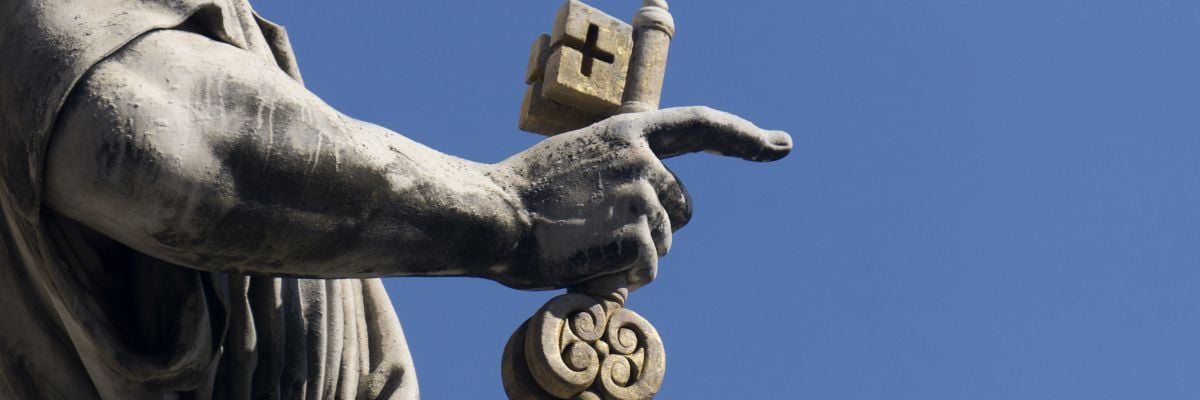
Question:
Answer:
While the assembled bishops at Vatican I did invoke the authority of the Fathers on the issue of papal primacy (cf. Sess. 4, ch. 4), they did not say that only those doctrines that enjoyed universal and unanimous consent of the Fathers were to be believed. In fact, Vatican I says nothing even remotely like that. It appeals to the testimony of the Fathers only briefly, after having first given a detailed elucidation from Scripture of the doctrines of papal primacy and infallibility.
It’s a matter of historical record that the Church Fathers disagreed on various issues. Some, such as Origen and Tertullian (who are not officially titled “Fathers,” although they are ranked among the major theological writers of the early Church), even lapsed into heresy. The point is not that every Father agreed with every other Father on every issue–that would constitute an absolute mathematical unanimity, something which the Catholic Church does not claim. Rather, there was a moral unanimity of teaching among the Fathers. This means that doctrines such as the ones listed in your question were universally held and taught by the Catholic Church. Some Fathers wrote on these issues, to greater and lesser extents. Some never mentioned certain doctrines at all (at least not in their writings which have survived), and others can be seen to have held erroneous opinions about other doctrines.
The Catholic Church never has claimed that every Church Father at all times believed and taught every single Catholic doctrine in the sense that the Church teaches it. It is the Church as a single organic entity, the Body of Christ (cf. 1 Cor 12:12-27) that always and everywhere has faithfully guarded and proclaimed the apostolic deposit of faith—not necessarily its individual members. This is true today. The Catholic Church universally teaches, as it always has, the Real Presence of Jesus in the Eucharist. But there are droves of “Catholics” who, as a result of spiritual apathy or being poorly catechized, do not believe this doctrine as taught by the Church. This in no way contradicts the truth that the Church “universally” holds this doctrine.
Purgatory, baptismal regeneration, and papal primacy were universally taught in the early Church, as can be demonstrated by a study of patristic writings. (For starters, consider the many quotations from the Fathers on these issues in “The Fathers Know Best” department of Catholic Answers Magazine). The Fathers appealed not only to Scripture as their doctrinal authority, but also to the Fathers who came before them, to show the constant tradition of Catholic teaching on a given subject.
Around 150 Irenaeus appealed to the traditional teachings of the Fathers (Against Heresies 2:2-4) to show that Catholic teaching could be established from both Scripture and Tradition. Tertullian appealed to the moral unanimity of the Fathers who preceded him to show the universality of Catholic doctrine:
[Is it plausible to imagine that the Holy Spirit] neglected his office, permitting the churches [dioceses] for a time to understand differently, and to believe differently, what he himself was preaching by the apostles; is it likely that so many churches, and they so great, should have gone astray into one and the same faith? Error of doctrine in the churches must necessarily have produced various issues [beliefs]. When, however, that which is deposited among many is found to be one and the same, it is not the result of error, but of tradition. (Praescripciones 28)
Basil of Caesarea appealed to the testimony of the Fathers:
Now I accept no newer creed written for me by other men, nor do I venture to propound the outcome of my own intelligence, lest I make the words of true religion merely human words; but [only] what I have been taught by the holy Fathers, that I announce to all who question me. In my Church the creed written by the holy Fathers in synod at Nicaea is in use. (Letter 140:2)
Vincent of Lerins summarized the issue:
Therefore, as soon as the corruption of each mischievous error begins to break forth, and to defend itself by filching certain passages of Scripture, and expounding them fraudulently and deceitfully, forthwith the opinions of the ancients in the interpretation of the canon are to be collected, whereby the novelty . . . may be condemned. But the opinions of those Fathers only are to be used for comparison who, living and teaching, holily, wisely, and with constancy, in the Catholic faith and communion, were counted worthy either to die in the faith of Christ or to suffer death happily for Christ. Whom yet we are to believe on this condition, that only is to be accounted indubitable, certain, established, which either all or the most part have supported and confirmed manifestly, frequently, persistently, in one and the same sense, forming, as it were, a consentient council of doctors, all receiving, holding, handing on the same doctrine. But whatsoever a teacher holds, be he a bishop, be he a confessor, be he a martyr, let that be regarded as a private fancy of his own, and [let it] be separated from the authority common, public, general persuasion. (Commonitoria 28:72-23 [A.D. 434])


